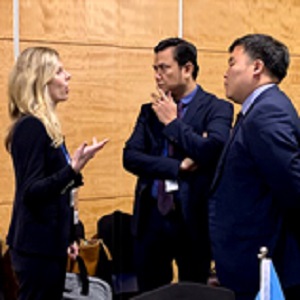World Border Security Congress2019-08-28 14:05:04
Explosive growth of synthetic drug production and trafficking in East and Southeast Asia
Following recent reports of the explosive growth of synthetic drug production and trafficking in East and Southeast Asia, the United Nations Office on Drugs and Crime ( UNODC) Synthetics Monitoring: Analyses, Reporting and Trends (SMART) Programme and the Central Narcotics Bureau of Singapore convened a meeting of criminal intelligence analysts, forensic specialists and customs officials from ASEAN member states, Australia, Canada, China, Japan, the Republic of Korea, the United States and the World Customs Organization's Regional Intelligence Liaison Office Asia Pacific, to discuss latest developments and strategies.
Synthetic drugs have rapidly become the most profitable illicit business in the region as organized crime groups have innovated their business model and engineered an expansion of the methamphetamine market, which is now valued at up to USD$ 61.4 billion annually according to the recent UNODC report Transnational Organized Crime in Southeast Asia: Evolution, Growth and Impact. At the same time, the growing diversity of synthetic drugs, including ketamine and synthetic opioids found across East and Southeast Asia are concerning for public security and health authorities. Countries are increasingly voicing concerns that the diversity of synthetic drugs emerging in the region is making it difficult for law enforcement and public health officials to implement effective responses.
"The many governments and experts here appreciate that the scale of synthetic drug production and trafficking in East and Southeast Asia, and the variety of substances entering the market, is something never seen before", said Martin Raithelhuber, SMART Programme Manager. "We see a consensus emerging that this is now a top policy priority for the region, and we have momentum to discuss and develop workable solutions."
"While the use of new psychoactive substances hasn't reached the levels of methamphetamine, there are an increasing number available in the illicit drug market of this region, and they often mimic other drugs and users may not know what they are taking," said Mufi Djusnir, Head of Indonesia's Narcotics Laboratory Intelligence Centre. "Whether it is methamphetamine or other synthetic drugs, precursor chemicals are needed by traffickers, and they don't have any problem sourcing them. Addressing diversion from chemical and pharmaceutical industries, is a top priority and we are glad the UNODC regional precursor programme agreed last year is moving forward."
Regional and international experts at the meeting echoed the view that reducing the supply of precursor chemicals required to manufacture synthetic drugs would be one of the most effective measures to address synthetic drug challenges in the region. "Growing synthetic drug production would not be possible without a matching surge in precursor chemical trafficking," emphasized Inshik Sim, SMART Regional Analyst. "The fact is that governments continue to report very few seizures of precursor chemicals, and we know that reducing their availability will undermine illicit production and the business model of producers. We have the right group here to discuss the situation and share the latest information and experiences, as well as plans to address the problem."
Several countries have raised concerns about detection and forensic capacities which limit their ability to identify and seize new synthetic drugs and precursor chemicals. "The situation faced by frontline and border officers is quite complex, and they often do not have the understanding, training or equipment to know what the substances are or if they are dangerous," remarked Zaw Lin Oo, Head of Project Management Department, the Central Committee for Drug Abuse Control (CCDAC) of the Myanmar Police Force (MPF). "This meeting is important not only so we can share information and intelligence, but so we can express our concerns, understand the situation, and consider solutions."
Delegates agreed to address precursor chemical and pharmaceutical diversion in a coordinated way moving forward, and that UNODC's regional precursor and SMART programmes would be central to these efforts. A timeline for a coming regional analysis of synthetic drugs and a law enforcement task force were also announced.
